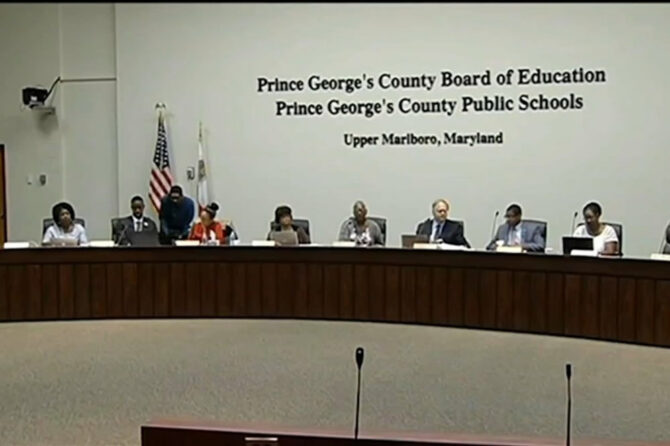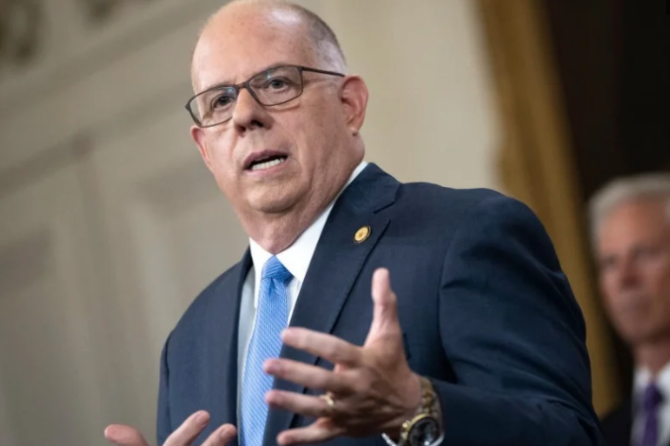WASHINTGON POST: The balance of power is shifting on the all-Democratic Prince George’s County Council, which elevated Jolene Ivey, District 5, and Sydney Harrison, District 9, to leadership on Tuesday after a term that saw a more liberal majority pull the body further left. The council voted unanimously to install Ivey as chair in an annual exchange of power, handing her the ability to set the agenda as the council enters a term its members say will be shaped by a tight county budget and increasing needs.
Ivey laid out her plans moments after the vote: meeting the increasing needs of vulnerable citizens, diversifying revenue sources, focusing on “smart development,” and fully staffing public safety in an effort to lessen crime in Prince George’s. Other priorities include lessening the county’s reliance on property taxes and working in partnership with County Executive Angela D. Alsobrooks (D), who is running for U.S. Senate, Ivey said.
In prepared remarks, she reinforced how the body should work together to accomplish these goals, signaling a desire for unity after a year of division over priorities set when a more liberal majority took hold, calling itself the “people’s council.”“We are stronger together when everyone’s voice is heard. Our challenges become steppingstones for success,” Ivey said. “We will do these things together. … Our council members unified, we can meet and exceed expectations.”
Ivey’s speech was met with a standing ovation of an audience that included her husband, Rep. Glenn Ivey (D-Md.), and former state senator Victor Ramirez (D).Ivey is in her second four-year term on the council, after representing the 47th District in the state House of Delegates from 2007 to 2015. She has been married to Glenn Ivey since the late 1980s, and they have five sons. Their son Julian Ivey (D) serves in the House of Delegates. The Iveys have elected officials at every level of government — local, state and federal, each representing Prince George’s County. Ivey herself frequently voted with the group of six more liberal members in 2023. The group pushed forward rent stabilization, project labor agreements and a basic-income pilot program that launched last month. Ivey succeeds Thomas Dernoga, District 1, as council chair. Ivey drew hushed murmurs in the council chamber on Tuesday after thanking District 6 council member Wala Blegay for her service as vice chair in 2023 before selecting Harrison, saying she was “in need of an experienced hand” next to her — a move that was ultimately backed by her colleagues, even after several had expressed their support for Blegay. Harrison, who preceded Blegay as vice chair, routinely takes a more moderate, fiscally reserved approach to governance and will be positioned as a strong voice as the council faces what county officials predict will be a tight budget year. Harrison often found himself at odds with the socially liberal proposals of the council this term as it pushed for project labor agreements and rent stabilization, focusing on funding sources for ambitious projects in debate that illuminated the shades of Democratic blue that exist among the all-Democratic council. All members have told The Washington Post that the budget and the limitations the county will face in 2024 are of concern. During a news conference after the gavel exchange, Ivey said Harrison’s perspective will be crucial to weathering the next year.
An October report from the county’s Spending Affordability Committee estimated that the county will have to tighten its budget in the coming fiscal year in the face of dipping tax revenue and increases in mandatory spending.Analysts predict that county revenue will decrease $58 million in the fiscal year that begins July 1, 2024. Coupled with the rising costs of programs such as the Blueprint for Maryland’s Future, the report projects a widening deficit if trends persist — from $183 million in the next fiscal year to $387 million in fiscal year 2030.The committee suggested that the county adopt “cost containment actions” in the current fiscal year to begin addressing the projected shortfall.“We just have to stay laser-focused on the budget, being able to pay for schools, to pay for police, the fire department, everything that takes over most of our budget,” Ivey said. “Also, we always want to take care of the most vulnerable. Sometimes all of those competing choices make our lives very difficult. But this is why we’re elected.”
Striking a balance will be critical, said Harrison, noting that the cost of living and providing services is increasing and that the county must think big to meet those challenges.
“What we’re trying to do also is expand our tax base in a way that’s equitable for everyone, in a way that relieves the stress from homeowners, and then also creates the opportunity where everyone puts into the pot and we move our government forward to provide the best possible services that we can,” he said.










